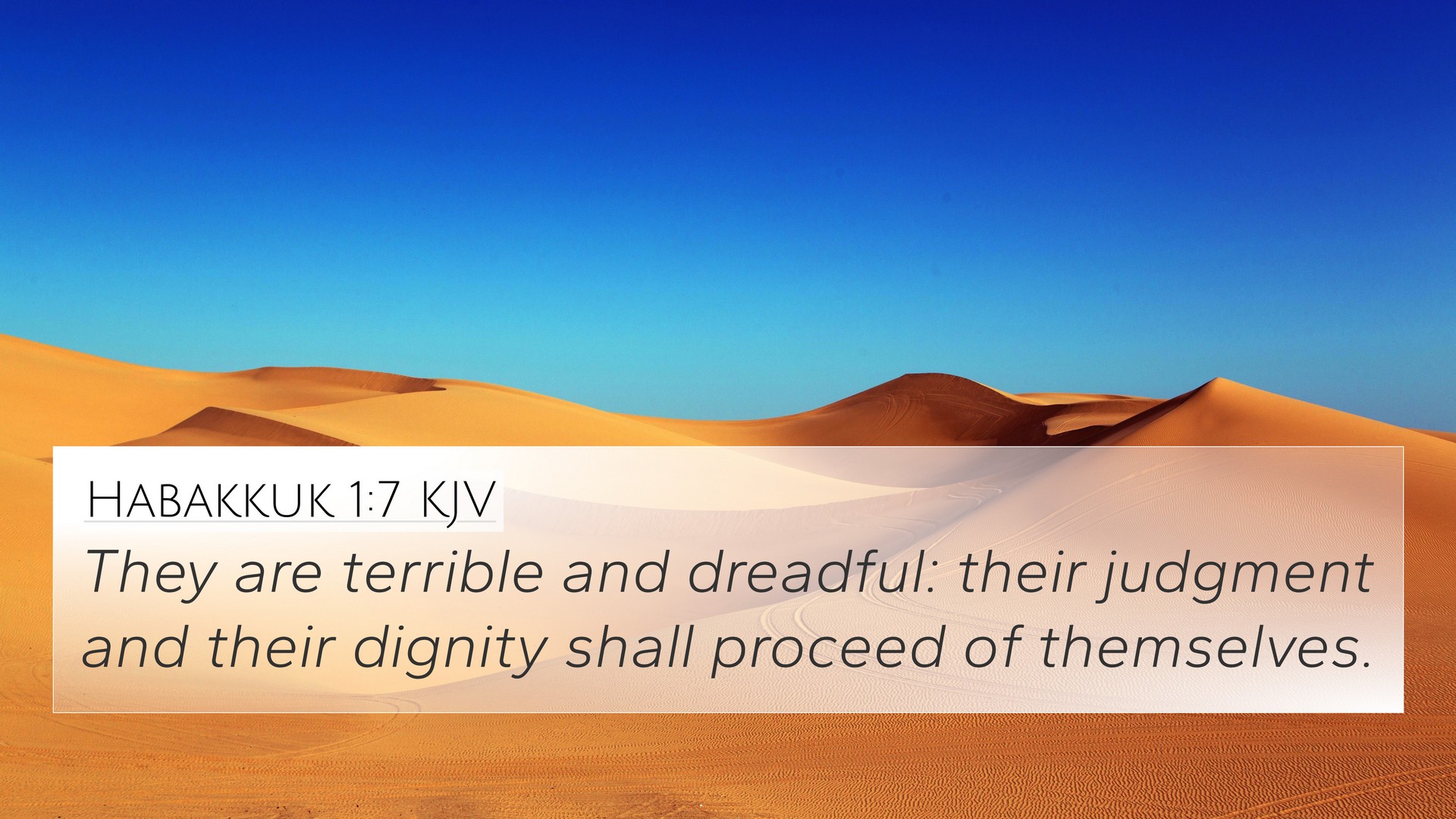Old Testament
Genesis Exodus Leviticus Numbers Deuteronomy Joshua Judges Ruth 1 Samuel 2 Samuel 1 Kings 2 Kings 1 Chronicles 2 Chronicles Ezra Nehemiah Esther Job Psalms Proverbs Ecclesiastes Song of Solomon Isaiah Jeremiah Lamentations Ezekiel Daniel Hosea Joel Amos Obadiah Jonah Micah Nahum Habakkuk Zephaniah Haggai Zechariah MalachiHabakkuk 1:7 Similar Verses
Habakkuk 1:7 Cross References
They are terrible and dreadful: their judgment and their dignity shall proceed of themselves.
Uncover the Rich Themes and Topics of This Bible Verse
Listed below are the Bible themes associated with Habakkuk 1:7. We invite you to explore each theme to gain deeper insights into the Scriptures.
Habakkuk 1:7 Cross Reference Verses
This section features a detailed cross-reference designed to enrich your understanding of the Scriptures. Below, you will find carefully selected verses that echo the themes and teachings related to Habakkuk 1:7 KJV. Click on any image to explore detailed analyses of related Bible verses and uncover deeper theological insights.
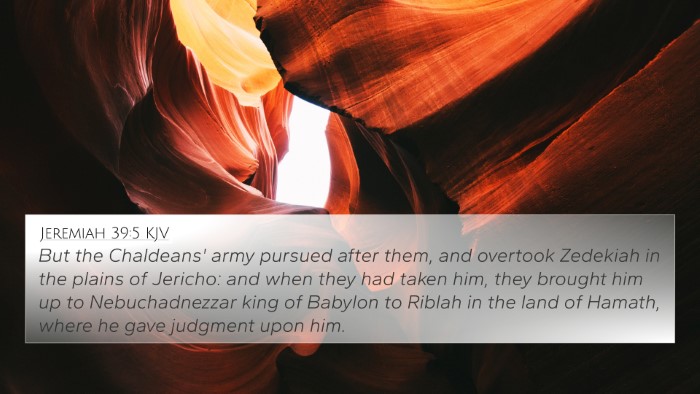
Jeremiah 39:5 (KJV) »
But the Chaldeans' army pursued after them, and overtook Zedekiah in the plains of Jericho: and when they had taken him, they brought him up to Nebuchadnezzar king of Babylon to Riblah in the land of Hamath, where he gave judgment upon him.

Deuteronomy 5:27 (KJV) »
Go thou near, and hear all that the LORD our God shall say: and speak thou unto us all that the LORD our God shall speak unto thee; and we will hear it, and do it.
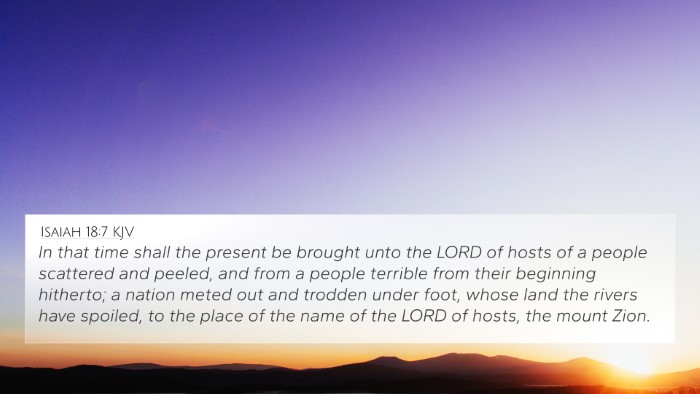
Isaiah 18:7 (KJV) »
In that time shall the present be brought unto the LORD of hosts of a people scattered and peeled, and from a people terrible from their beginning hitherto; a nation meted out and trodden under foot, whose land the rivers have spoiled, to the place of the name of the LORD of hosts, the mount Zion.
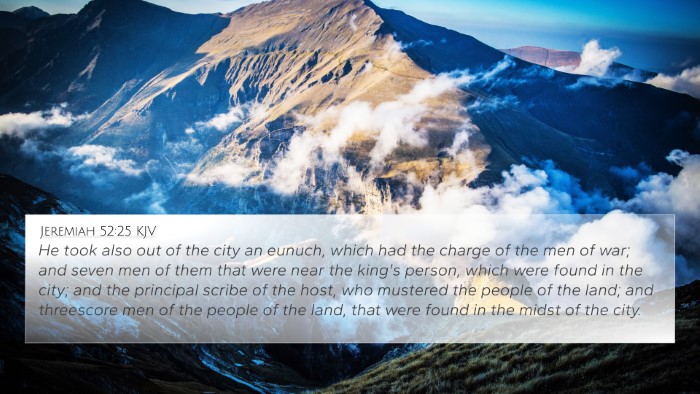
Jeremiah 52:25 (KJV) »
He took also out of the city an eunuch, which had the charge of the men of war; and seven men of them that were near the king's person, which were found in the city; and the principal scribe of the host, who mustered the people of the land; and threescore men of the people of the land, that were found in the midst of the city.
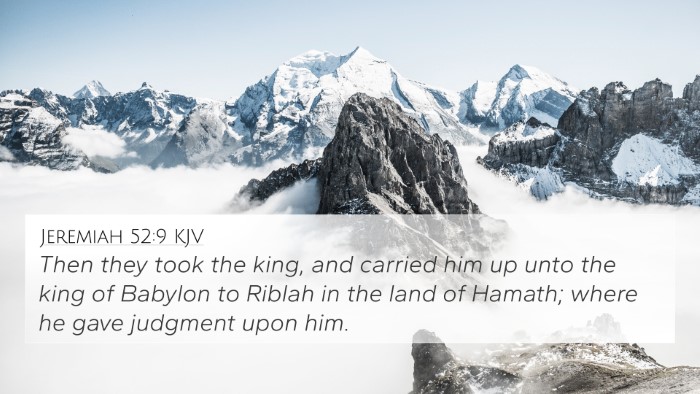
Jeremiah 52:9 (KJV) »
Then they took the king, and carried him up unto the king of Babylon to Riblah in the land of Hamath; where he gave judgment upon him.
Habakkuk 1:7 Verse Analysis and Similar Verses
Understanding Habakkuk 1:7
Habakkuk 1:7: "They are terrible and dreadful; their judgment and their dignity proceed of themselves." This verse presents a critical reflection on the Babylonian empire, highlighting their nature and authority.
Verse Meaning and Interpretation
This verse encapsulates the profound concerns expressed by the prophet Habakkuk regarding the rising power of the Babylonians. Drawing insights from public domain commentaries, we can uncover several layers of meaning within the text:
-
Matthew Henry's Commentary:
Henry illustrates that Habakkuk declares the Babylonians' character as "terrible and dreadful," emphasizing their fearsome reputation and the destructive nature of their conquests. The phrase underscores God’s sovereign use of even wicked nations to fulfill His plans.
-
Albert Barnes' Notes:
Barnes highlights that the Babylonians are depicted as self-sufficient in their judgments, suggesting that they act with autonomy, perhaps indicating their arrogance. This interpretation aligns with the context of divine justice, which Habakkuk sought to understand.
-
Adam Clarke's Commentary:
Clarke provides insights into the moral implications of the verse, suggesting that it serves as a reminder that God can utilize ungodly nations to execute judgment while still maintaining His justice and righteousness. The dignity of the Babylonians is viewed as contrived and ultimately under God's domain.
Connections and Cross-References
Several other Bible verses relate strongly to Habakkuk 1:7, providing a broader context and thematic connections:
- Jeremiah 4:7: The "lion has come up from his thicket," resonates with the imagery of destruction associated with Babylon.
- Isaiah 10:5: "O Assyrian, the rod of my anger," connects to the theme of nations being used as instruments of judgment.
- Habakkuk 1:11: "Then they shall sweep by like the wind and be guilty," echoes the self-sufficient nature of the Babylonians.
- Isaiah 13:17-18: Discussing the Medes as a destroyer of Babylon complements the foreshadowing of judgment upon nations.
- Micah 5:9: “Your hand shall be lifted up over your adversaries,” highlights the divine authority over nations.
- Daniel 4:30: "Is this not great Babylon, that I have built?" relates to the pride and self-perception of Babylon's authority.
- Romans 13:1: "For there is no authority except from God," further explains God's sovereignty over all rulers and nations.
- Revelation 18:2: The fall of Babylon represents the ultimate judgment of nations, connecting future events with Habakkuk's concerns.
- James 4:6: “God opposes the proud but gives grace to the humble," reinforces the idea of God’s opposition to earthly pride.
Thematic Analysis
The themes derived from Habakkuk 1:7 align closely with the overall discourse on divine justice, the nature of power, and the mystery of God’s actions through history. These themes appear throughout biblical texts, encouraging believers to seek understanding through cross-referencing and thematic analysis of Scriptures.
Tools for Bible Cross-Referencing
To effectively study Habakkuk 1:7 and its connections, consider the following resources:
- Bible Concordance: A comprehensive tool for identifying keywords within verses.
- Bible Cross-Reference Guide: Helps in discovering the overarching themes and connections between various Scriptures.
- Bible Reference Resources: Various study Bibles offer insights into verses and their contexts.
- Cross-Reference Bible Study: Methods that facilitate deeper understanding of linked verses.
- How to Use Bible Cross-References: Guides that explain the use of Bible cross-referencing in personal study or sermon preparation.
Conclusion
In summary, Habakkuk 1:7 serves as a poignant reminder of the complexity of God’s plans as illustrated through the Babylonians' character and actions. Connecting this verse with others in Scripture enriches the understanding of God’s sovereignty, the nature of power, and His ultimate justice. Employing tools for Bible cross-referencing enhances the study experience, allowing for a deeper engagement with the text and its meanings.
